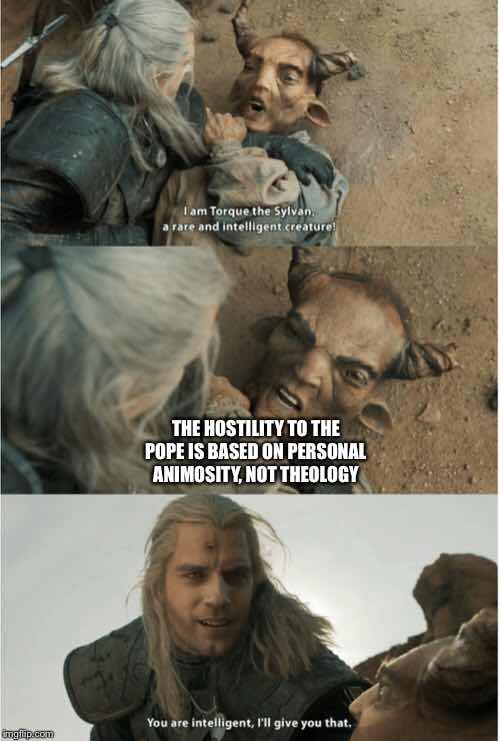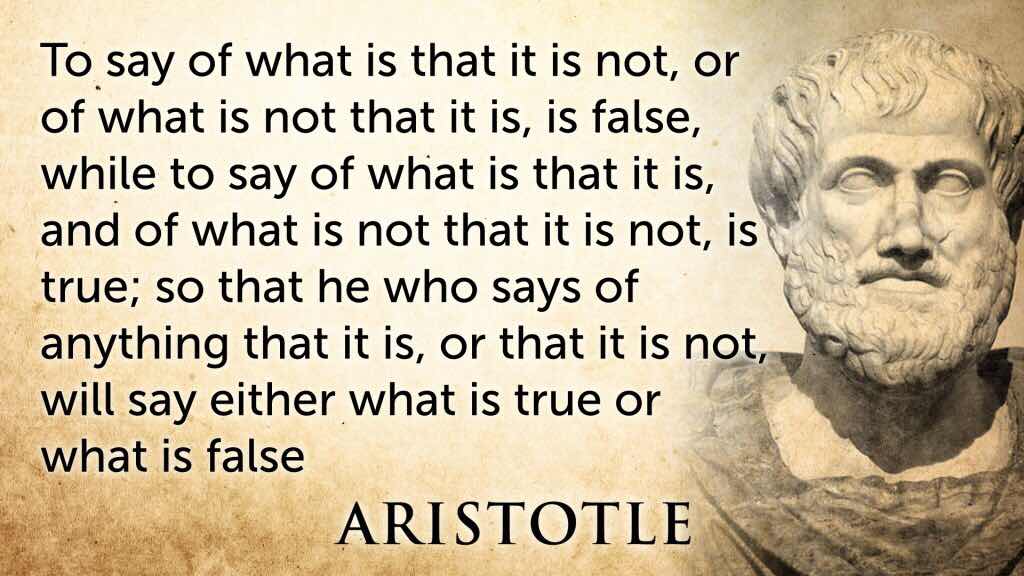The non-Catholic who happens to think the Church is wrong is different from the anti-Catholic. The former believes their own denomination is right and has been (wrongly) taught that the Church is in error. Because they believe what they have been taught, they tend to interpret what the Church does in light of what they have been taught.
 The attitude of anti-Catholics often exists among Catholics who are hostile to the Pope. They believe that Pope Francis is an evil to be opposed. They believe the oft-repeated calumnies against him because they think he is capable of it. Those of us who defend him are either deceived or willfully part of his plans.
The attitude of anti-Catholics often exists among Catholics who are hostile to the Pope. They believe that Pope Francis is an evil to be opposed. They believe the oft-repeated calumnies against him because they think he is capable of it. Those of us who defend him are either deceived or willfully part of his plans.
 I could go on and on, and the Pope bashers and anti-Catholics undoubtedly will. In both cases, we see groups who are quite convinced of their own self-righteousness but absolutely in the wrong about the truth. In defending the Pope, we are not defending error. We are flatly denying that the accusations are true.
I could go on and on, and the Pope bashers and anti-Catholics undoubtedly will. In both cases, we see groups who are quite convinced of their own self-righteousness but absolutely in the wrong about the truth. In defending the Pope, we are not defending error. We are flatly denying that the accusations are true.
The latter, on the other hand, believes that the Catholic Church is an evil institution that must be opposed in her “lies” and “manmade doctrines.” Those of us who are members of the Catholic Church are either “blind” to her “errors” and need “rescuing,” or are part of the reprobate because we refuse to leave when faced with their dubious “evidence.” Because they believe the Church is an evil institution, they believe every lie told against us because they think we are capable of it. What the Church actually teaches is misinterpreted or misrepresented and those falsehoods are repeated so widely that the anti-Catholics think they must be true. Often they point to the shameful events in history and treat them as “Catholic” inventions, forgetting they were cultural practices that both predated Christianity and were used in Protestant nations*.
Here, apologetics play a role. By pointing out the falsehoods, we can explain what we really do believe to the non-Catholics of good will and help inoculate them and Catholics unfamiliar with what we do believe from believing the calumny spread against us. Apologetics might not always lead people to accept the Catholic Church. But we can at least make the truth known.
Here, apologetics can help the people of good will realize that the anti-Francis calumnies are untrue. They can point out that the oft-repeated quotes are either taken out of context or sheer fabrication, and point out the preconceived biases that lead to the accusations.
It is ridiculous for anti-Catholics to claim that the Spanish Inquisition killed 100 million people when the whole of Europe didn’t have that many people before the Industrial Revolution. It is ridiculous to claim (a la Jack Chick’s “The Death Cookie”) that the IHS on some hosts stands for “Isis Horus Set” when it really is Latinizing the Greek letters ΙΗΣ which stands for ΙΗΣΟΥΣ (IESOUS—Jesus#).
In a similar way, it is absurd for anti-Francis Catholics to claim that the Pope is promoting same sex marriage when he explicitly says that the Church cannot do so. It is absurd to say he is promoting idolatry when he consistently preaches about Jesus being the only way to salvation. It is absurd to call him a socialist breaking with the Church when he makes the same criticism of unfettered capitalism that his predecessors.made.
Now some people I know protest that they are not Pope bashers, but only expressing “concern” about what the Pope said that seems to “prove” he is in error. They say they reject the extremists and only want to be faithful to the truth. It sounds nice, but I have encountered anti-Catholics back in this blog’s Xanga days who claimed that they opposed to the extremism of Jack Chick and merely were concerned about the “errors” taught by the Church.
In both cases, the people assumed that:
- If I was [anti-Catholic (or anti-Francis)], I would be [an extremist].
- I am not [an extremist].
- Therefore, I am not anti-Catholic (or anti-Francis)].
This is logically correct§. But the premise is false. To understand this, let’s restate the form of the argument with different terms:
- If I was [in California], I would be [in Los Angeles].
- I am not [in Los Angeles].
- Therefore I am not [in California].
One can be anti-Catholic without being part of the Thomas Nast, Jack Chick, Tony Alamo extremes. One can be anti-Francis without being a sedevacantist or a member of the SSPX. What makes a person an anti-Catholic or an anti-Francis Catholic is not extremism. It is an opposition that automatically assumes that the target must be wrong and is guilty of whatever charges are leveled, even though the charges have been refuted.
And many people are in these groups, even when they deny it.
___________________
(*) Burning witches at the stake happened much less frequently in countries with the Inquisition than Protestant England and Germany (and in Catholic countries without the Inquisition). I don’t say that as a tu quoque. Rather, it this method of execution (like trials by ordeal) was more common in Germanic nations than elsewhere where the law of the Roman Empire existed.
(#) H in Greek is the capitalized letter ETA, a long vowel sound.
(§) I’m embarrassed to admit I got things twisted in editing where my intent went one way and the edit reversed the order of the syllogism. WPI commenter “Bernie” pointed it out. I’ve made edits in a way to avoid drastically changing the text. Mea culpa.


No comments:
Post a Comment